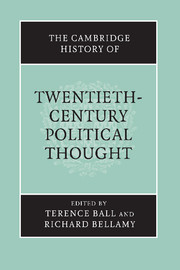Book contents
- Frontmatter
- Editors’ introduction
- Part I The changing fortunes of liberal democracy
- Part II Varieties of Marxism
- 10 The Second International: socialism and social democracy
- 11 The Russian Revolution: an ideology in power
- 12 Asian communism
- 13 Western Marxism
- 14 French Marxism – existentialism to structuralism
- Part III Science, modernism and politics
- Part IV New social movements and the politics of difference
- Part V Beyond Western political thought
- Biographies
- Bibliography
- Subject index
- Name index
- References
14 - French Marxism – existentialism to structuralism
from Part II - Varieties of Marxism
Published online by Cambridge University Press: 28 March 2008
- Frontmatter
- Editors’ introduction
- Part I The changing fortunes of liberal democracy
- Part II Varieties of Marxism
- 10 The Second International: socialism and social democracy
- 11 The Russian Revolution: an ideology in power
- 12 Asian communism
- 13 Western Marxism
- 14 French Marxism – existentialism to structuralism
- Part III Science, modernism and politics
- Part IV New social movements and the politics of difference
- Part V Beyond Western political thought
- Biographies
- Bibliography
- Subject index
- Name index
- References
Summary
Introduction
In its nineteenth-century heyday, Marxism was an avowedly internationalist doctrine promising universal human emancipation; its twentieth-century fate, though, was to splinter under the pressure of more local concerns, and to be forced into restrictive national boundaries. In the East, Marxism became an ideology of the state; in the West, it remained outside the portals of state power, in some countries relegated to the margins of public life, in others achieving a certain cultural centrality. In France, the latter was emphatically the case.
Of all these national forms taken by Marxism in the West, the French species developed comparatively late. It came to prominence after 1945 – almost three decades after the wave of revolutionary upheaval had swept other parts of Europe. Yet after the end of the Second World War, France – or more precisely, Paris – almost overnight established itself as the most important forging house for Western ideas of revolution. The theories and ideas that emanated from the French capital gained a spectacular eminence in Marxist thought across the globe, and provoked developments that took Marxism into areas quite remote from its founding preoccupations. The history of this intellectual episode is, therefore, a vital and vivid fragment of the history of twentieth-century radical thought.
- Type
- Chapter
- Information
- The Cambridge History of Twentieth-Century Political Thought , pp. 299 - 318Publisher: Cambridge University PressPrint publication year: 2003
References
- 1
- Cited by

